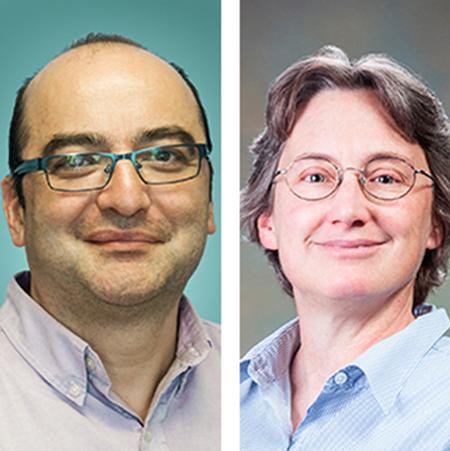Sandia scientists Ali Pinar (8962) and Cindy Phillips (1400) have been selected as distinguished members of the Association for Computing Machinery (ACM).
ACM, the world’s leading association of computing professionals, selected Ali and Cindy for their significant accomplishments and impact in computing. ACM recently selected 49 members for this recognition in the areas of education, engineering, and science.
Ali, a principal member of the technical staff, centers his work on applying graph algorithms to real-world problems. He has worked on combinatorial problems arising in parallel and scientific computing, electric power systems, and data, especially graph mining.
He first worked at Sandia as an intern in 1999 while he was working toward his PhD at University of Illinois at Urbana-Champaign. He received his bachelor’s degree in computer science from Bilkent University in Turkey and PhD in computer science from the University of Illinois. Since returning to Sandia full-time in 2008, he has focused on modeling and analysis of graphs and using sampling and streaming algorithms for massive data sets. This recent work has received three best paper prizes from the Society for Industrial and Applied Mathematics, ACM, and the Institute of Electrical and Electronics Engineers (IEEE).
Ali is a member of Society for Industrial and Applied Mathematics (SIAM), and IEEE. He is a member of the editorial boards of SIAM Journal on Scientific Computing, SIAM News, and Journal of Complex Networks. He has chaired five international meetings and served on more than 40 program committees.
Cindy, a senior scientist in Sandia’s Computing Research Center, conducts research in combinatorial optimization, algorithm design and analysis, and parallel computation. She has applied these techniques to many areas including scheduling, network and infrastructure surety, integer programming, graph algorithms, computational biology, quantum computing, computer security, wireless network management, social network analysis/graph data mining, sensor placement, and co-design of algorithms for next-generation architectures.
She received a bachelor’s degree in applied mathematics from Harvard University and a PhD in computer science from Massachusetts Institute of Technology. She has been at Sandia since 1990. Her papers on combinatorial scheduling, with academic co-authors, have influenced the real-time scheduling community. She was a member of a team that won an R&D 100 award in 2006 for supercomputer processor allocation and a member of a finalist team for the Edelman award in 2008 for sensor placement in municipal water networks.
Cindy has chaired seven major international meetings and served on more than 60 program committees. In particular, she has served on the program committee for at least 20 ACM conferences, including chairing its flagship parallel algorithms conference, the ACM Symposium on Parallelism in Algorithms and Architectures. She also served as a conference officer.
The distinguished members are selected from leading academic institutions and corporate and national research laboratories around the world. This year, ACM selected distinguished members from Argentina, Belgium, Canada, China, Egypt, Finland, Hong Kong, India, Japan, Portugal, Qatar, the United Kingdom, and the United States.
